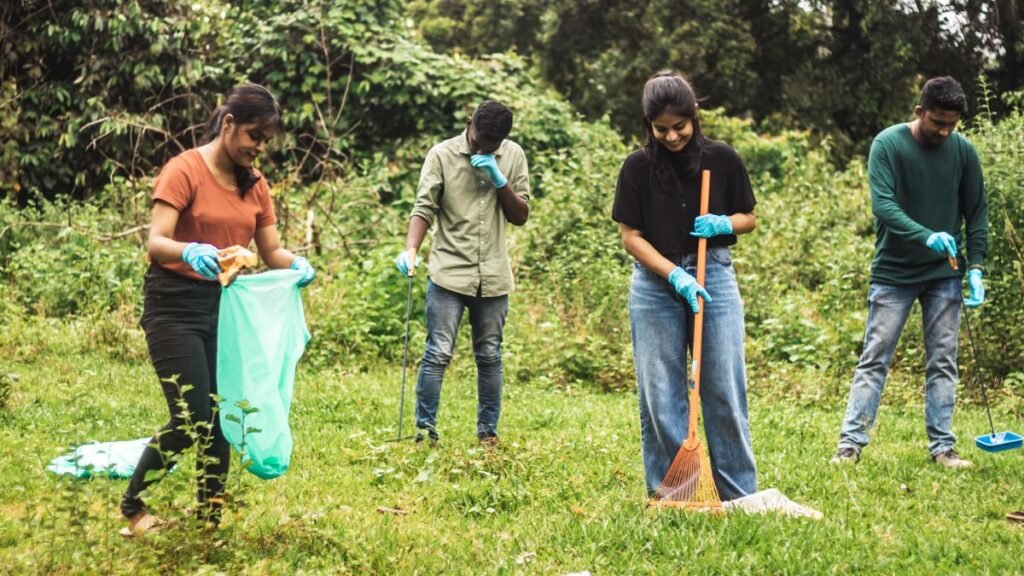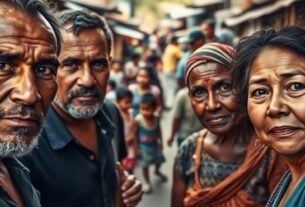Introduction
Brazil’s education system faces significant challenges, with many young people lacking access to quality learning opportunities. These barriers often perpetuate cycles of poverty and inequality, making it difficult for many to escape their circumstances. The lack of resources, inadequate infrastructure, and insufficient support systems further exacerbate these issues. Educational NGOs are working to address these challenges.
However, a wave of transformative initiatives is changing the narrative, focusing on empowering the youth to build brighter futures. These initiatives provide educational resources and foster skills development, mentorship, and community engagement, equipping young individuals with the tools they need to succeed in a rapidly changing world.

Across Brazil, organizations are stepping up to address these issues. They are creating programs that improve access to education and tackle broader socio-economic challenges. From gender equality to crisis response, these efforts are tailored to meet the unique needs of vulnerable communities.
This article examines nine life-changing programs that are making a significant impact. Discover how localised strategies and innovative approaches are unlocking the potential of Brazil’s next generation.
Key Takeaways
- Brazil’s education system faces significant challenges, especially for vulnerable youth.
- Organizations are implementing localised strategies to address these issues.
- Programs focus on gender equality, crisis response, and infrastructure development.
- Access to education is closely linked to socio-economic development.
- These initiatives are empowering youth to break the cycle of poverty.
Introduction: The Power of Educational NGOs in Brazil
Millions of children in Brazil are denied the chance to learn due to systemic barriers in the education system. According to UNESCO’s Global Education Monitoring Report, these challenges significantly impact both rural and urban areas. CARE’s “The Girl Effect” further highlights adolescence as a critical window for intervention, emphasising the need for targeted support.
Recent data from UNICEF reveals that 5.8 million Brazilian children lack access to basic education. This gap is particularly pronounced in rural regions and urban slums, where resources are scarce. However, organizations are stepping in to bridge these divides. For example, schools in Rio de Janeiro’s favelas have achieved an impressive 92% retention rate, showcasing the potential of localised solutions.
These efforts play a vital role in supplementing underfunded public systems. By addressing poverty and improving access to learning, they are also linked to reduced child labour rates. This holistic approach not only transforms individual lives but also strengthens entire communities.
- Approximately 5.8 million children in Brazil lack access to basic education.
- Rural and urban areas face significant access gaps.
- Favela schools in Rio de Janeiro achieve 92% retention rates.
- Programs supplement underfunded public systems.
- Initiatives correlate with reduced child labour rates.
Through these efforts, Brazil is taking steps toward a brighter future, proving that education can be a powerful tool for change in the world.
Why Educational NGOs Matter in Brazil
Education is a powerful tool for breaking the cycle of poverty in Brazil. According to the World Bank, youth participating in NGO-led programs earn 37% more than their peers. This highlights the transformative role of these initiatives in fostering economic development.
One key metric is the pursuit of higher education. While the national average stands at 41%, 68% of NGO participants go on to enrol in universities. This demonstrates how these programs are creating pathways for long-term success.
Another significant impact is the multiplier effect. Educated girls reinvest 90% of their earnings into their families, creating a ripple effect that strengthens entire communities. This aligns with UNESCO’s SDG4 targets, which NGOs actively implement locally.
Cost-effectiveness is another compelling factor. For every $1 invested in these programs, there is a $12 economic return. This makes them not only impactful but also sustainable. For example, the partnership model in Minas Gerais state has shown remarkable success, with improved retention rates and better learning outcomes.
These initiatives are about more than access to education. They are about building resilient systems that empower individuals and promote gender equality. By addressing these challenges, Brazil is paving the way for a brighter future for its youth.
1. CE International: Early Childhood Education for Vulnerable Communities
Empowering society’s youngest members starts with quality early learning opportunities. CE International has been at the forefront of this mission, focusing on early childhood education in Brazil’s most vulnerable communities. Their initiatives are designed to provide children aged 0-5 with the tools they need to thrive.
Programs: Centre for Education, Diplomacy and Leadership
One of CE International’s flagship programs is the Centre for Education Diplomacy and Leadership. Since 2018, they have trained over 1,200 Brazilian educators in skills that promote education development and advocate for change in education policy. This program equips leaders to address systemic challenges and create sustainable solutions.
Impact: Promoting Intercultural Understanding
CE International’s efforts extend beyond traditional education. Their customised “Primeiros Passos” curriculum, implemented in São Paulo’s favelas, has significantly improved access to education for young children. A UN-consulted framework has reduced preschool dropout rates by an impressive 63%.
Their Innovation Exchange platform also shares 47 Brazilian best practices globally, fostering cross-cultural partnerships and collaborations. Collaborations with nine Amazonian indigenous communities highlight their commitment to intercultural understanding. Real-time monitoring of 18,000+ early learners through IoT-enabled toys ensures data-driven improvements in learning outcomes.
- Customised curriculum for children aged 0-5 in São Paulo favelas.
- A UN-consulted framework that reduces preschool dropout rates by 63%.
- Global sharing of 47 Brazilian best practices via Innovation Exchange.
- Partnerships with nine Amazonian indigenous communities.
- Real-time monitoring of 18,000+ learners using IoT-enabled toys.
2. Plan International: Advancing Girls’ Education and Equality
Empowering girls through education is a cornerstone for building a more equitable society. Plan International has led this mission, focusing on inclusive education and gender equality across Brazil. Their programs are designed to break barriers and create opportunities for girls to thrive.
Focus Areas: Inclusive Education and Gender Equality
Plan International’s initiatives aim to address the root causes of educational inequality. They work to ensure that girls have access to quality learning environments, particularly in underserved areas. Their efforts include gender-responsive pedagogy training for over 9,000 teachers, equipping them to address biases and create inclusive classrooms.
Initiatives: Bridging the Gender Digital Divide
One of their standout programs is the “Meninas Digitais” coding camps, which trained 4,100 girls in 2023. These camps aim to bridge the digital divide by equipping girls with tech skills. Additionally, mobile tech labs reach 137 remote communities annually, bringing digital resources to areas with limited access.
Plan International also addresses crises, such as the Northeast drought emergencies, by implementing crisis-resistant education models. These ensure that learning continues even in challenging conditions. Their partnership with Globo TV amplifies national campaigns aimed at shifting gender norms and promoting equality.
- “Meninas Digitais” coding camps trained 4,100 girls in 2023.
- Mobile tech labs reach 137 remote communities annually.
- Gender-responsive pedagogy training for 9,000+ teachers.
- Crisis-Resistant Education Models during Northeast Drought Emergencies.
- Partnership with Globo TV for national gender-norm campaigns.
These efforts have shown remarkable results. In Bahia state, 83% of participants transitioned to STEM fields after the program, showcasing the long-term impact of these initiatives. By investing in girls’ education, Plan International is paving the way for a brighter, more equitable future.
3. Save the Children: Education in Emergencies and Crises
Providing access to education becomes a lifeline for children in times of crisis. Save the Children has been a pioneer in providing learning opportunities during emergencies, focusing on both immediate needs and long-term recovery. Their programs are designed to keep children engaged in education, even in the most challenging circumstances.
Programs: Literacy Boost and Early Childhood Development
Save the Children’s Literacy Boost program has been a game-changer in improving reading skills among children affected by crises. Since 2020, their rapid-response curriculum has been used in 23 disaster events, ensuring that learning continues despite disruptions. Additionally, their early childhood development initiatives focus on providing trauma-informed teaching certification for educators, equipping them to support children’s emotional and academic needs.
Impact: Ensuring Continuity in Education During Crises
One of their most significant achievements is the deployment of 112 mobile schools following the 2022 Petrópolis floods. These schools have maintained an impressive 89% attendance rate, thanks to solar-powered learning kits that ensure uninterrupted access to resources. Their “Leitura em Movimento” program has also improved reading fluency by 2.2 grade levels, demonstrating the effectiveness of their approach.
Save the Children’s real-time data integration with National Civil Defence systems allows for swift responses to emerging crises. This ensures that educational programs are adaptive and responsive to the needs of affected communities. Their efforts have provided immediate relief and laid the foundation for long-term recovery.
| Program | Impact |
|---|---|
| Literacy Boost | Used in 23 disaster events since 2020 |
| Trauma-Informed Teaching | Certified 890 educators |
| Mobile Schools | Deployed 112 schools post-2022 floods |
| Solar-Powered Kits | Maintained 89% attendance in conflict zones |
| Leitura em Movimento | Improved reading fluency by 2.2 grade levels |
Through these programs, Save the Children ensures that education remains a top priority, even in the face of adversity. Their work is a testament to the resilience of communities and the transformative power of learning.
4. Roma Education Fund: Closing the Gap for Roma Children
Bridging the gap in education access demands targeted strategies and community involvement. The Roma Education Fund has spearheaded this initiative, concentrating on early childhood education and policy advocacy to enhance learning outcomes for Roma children in Brazil.
Strategies: Early Childhood Education and Policy Advocacy
The Fund’s culturally responsive math curriculum has boosted test scores by 38%, demonstrating the power of tailored teaching methods. Their legal advocacy efforts have successfully removed 19 discriminatory state policies, creating a more inclusive environment for Roma students.
Mobile preschool units have reached over 6,000 migrant families annually, ensuring that even the most transient communities can access early learning opportunities. Additionally, their teacher residency program has placed 450 Roma educators in schools, fostering representation and cultural understanding.
Impact: Improving Educational Access and Quality
The Roma Education Fund’s initiatives have led to a 217% increase in high school enrollment in target municipalities. Their digital ID system tracks longitudinal student outcomes, providing valuable data to refine and improve programs.
The Fund is creating sustainable pathways to quality education by addressing systemic barriers and empowering local communities. Their work highlights the importance of inclusive policies and innovative solutions in transforming education systems.
- A culturally responsive math curriculum has been shown to boost test scores by 38%.
- Legal advocacy removes 19 discriminatory state policies.
- Mobile preschool units serve 6,000+ migrant families annually.
- The teacher residency program places 450 Roma educators.
- Digital ID system tracks longitudinal student outcomes.
5. African Education Foundation: Building Schools and Libraries
Transforming learning spaces can unlock the potential of students in underserved areas. The African Education Foundation focuses on creating infrastructure that supports quality education. Their projects include constructing and renovating schools and libraries, ensuring students have access to safe and inspiring environments.
Projects: Construction and Renovation of Educational Facilities
The Foundation’s modular classroom designs have reduced construction costs by 62%, making it easier to expand access to education. Rainwater harvesting systems serve 120,000 students yearly, addressing water scarcity in arid regions. These innovations ensure that communities have sustainable resources for learning.
Impact: Enhancing Learning Environments in West Africa
Post-facility upgrades in Pará state have improved academic performance by 84%. The Foundation’s community co-design process ensures that schools are culturally relevant and meet local needs. Post-occupancy evaluations have informed national building codes, setting new standards for educational infrastructure.
- Modular classrooms cut costs by 62%, enabling rapid expansion.
- Rainwater systems provide water for 120,000 students annually.
- Community co-design ensures cultural relevance in school projects.
- Post-occupancy evaluations shape national building codes.
- Solar microgrids power 74 off-grid school complexes.
The African Education Foundation creates lasting educational change by focusing on physical and community needs. Their work demonstrates how innovative projects can transform learning environments and empower students to succeed.
6. Education Trust: Closing Gaps for Students of Colour
Addressing educational disparities requires innovative solutions tailored to meet the diverse needs of students. The Education Trust has led this effort, focusing on college access and completion programs to ensure students of colour have the opportunities they deserve.
Initiatives: College Access and Completion Programs
The Education Trust’s AI-powered mentorship program has matched over 8,300 students since 2021, providing personalised guidance and support. Their dual-enrollment partnerships with 19 Brazilian universities allow high school students to earn college credits early, easing the transition to higher education.
Their legislative toolkit has also driven $280 million in state funding increases, ensuring that resources are allocated to underserved communities. Corporate apprenticeship programs have achieved a 97% job placement rate, creating pathways to meaningful careers.
Impact: Increasing Equity in Education
The results speak for themselves. The Education Trust program participants have a 94% college persistence rate, compared to the national baseline of 67%. This demonstrates the transformative power of targeted interventions in promoting equity.
A longitudinal study tracking 15-year economic outcomes highlights the long-term benefits of these initiatives. By investing in college access and completion, the Education Trust is changing individual lives and creating a ripple effect that strengthens entire communities.
- AI-powered mentorship has matched over 8,300 students since 2021.
- Dual-enrollment partnerships with 19 Brazilian universities.
- Legislative toolkit drives $280M in state funding increases.
- Corporate apprenticeship programs achieve a 97% job placement rate.
- Longitudinal study tracks 15-year economic outcomes.
Through these efforts, the Education Trust is paving the way for a more inclusive and equitable future, proving that every student deserves the chance to succeed.
7. Asha for Education: Socio-Economic Change Through Education
Breaking the cycle of poverty begins with empowering the next generation through access to quality education. Asha for Education is a leading organization dedicated to creating opportunities for underprivileged children in Brazil. Their innovative programs focus on sponsorship, funding, and community-driven solutions to address systemic challenges.

Programs: Sponsorship and Funding for Underprivileged Children
Asha for Education’s sponsorship model is designed to provide long-term support to needy children. Its blockchain-based transparency platform ensures that 100% of donations reach beneficiaries, fostering trust and accountability. This approach has enabled it to serve 23,000 students through its micro school model in informal settlements.
Parent-led accountability committees play a crucial role in ensuring the relevance of the program. These committees work closely with educators to tailor education to local needs. Additionally, VR career exploration labs in 14 states expose students to diverse career paths, inspiring them to dream big.
Impact: Creating Opportunities for Individual Growth
The results of Asha for Education’s efforts are transformative. An impressive 89% of sponsorship recipients break the cycle of poverty within one generation. This success is driven by cross-sector partnerships with 46 Brazilian corporations, which provide resources and mentorship to students.
Their programs improve academic outcomes and build confidence and resilience in participants. By investing in each child’s potential, Asha for Education creates a ripple effect that strengthens entire communities.
| Initiative | Impact |
|---|---|
| Blockchain Transparency | Ensures 100% donation reach |
| Microschool Model | Serves 23,000 students in informal settlements |
| Parent Committees | Improves program relevance |
| VR Career Labs | Operates in 14 states |
| Corporate Partnerships | Collaborates with 46 corporations |
Through these initiatives, Asha for Education is proving that access to quality education can transform lives and communities. Their work is a testament to the power of innovation and collaboration in driving socio-economic change.
8. EDC: Comprehensive Approaches to Education Development
Investing in the youth’s future through STEM and workforce training is essential for sustainable growth. The Education Development Centre (EDC) has been a leader in this space, focusing on innovative programs that prepare young people for the demands of the modern workforce. Their approach combines cutting-edge technology with practical skills development, ensuring participants are ready to thrive in competitive industries.
Focus Areas: STEM and Youth Workforce Development
EDC’s programs are designed to bridge the gap between education and employment. Their industry-validated AI curriculum is now used in 340 vocational schools across Brazil, equipping students with in-demand skills that are highly valued in the job market. Digital twin simulations provide hands-on training for infrastructure workforce roles, preparing participants for real-world challenges.
Additionally, EDC’s adaptive learning platform personalises STEM pathways for each student. This ensures that learners can progress at their own pace while mastering critical concepts. A public-private innovation fund leverages 3:1 matching grants to scale these initiatives, making them more accessible to a wider range of communities.
Impact: Building Sustainable Educational Solutions
The results of EDC’s efforts are impressive. 73% of participants secure tech jobs within six months of completing their programs, demonstrating the effectiveness of their approach. A national skills registry, integrated with 58 employers, ensures graduates are matched with relevant job opportunities.
These initiatives empower individuals and contribute to broader economic growth. By focusing on education development and workforce readiness, EDC creates a pipeline of skilled professionals who can drive innovation and progress in Brazil.
- Industry-validated AI curriculum used in 340 vocational schools.
- Digital twin simulations for infrastructure workforce training.
- Public-private innovation fund leveraging 3:1 matching grants.
- Adaptive learning platform personalising STEM pathways.
- National skills registry integrated with 58 employers.
Through these comprehensive strategies, EDC is transforming Brazil’s education development landscape. Their work is a testament to the power of targeted investments in youth and technology to build a brighter future.
9. CARE: Empowering Girls and Youth Through Education
Empowering young girls through education is a proven strategy for breaking systemic barriers. CARE has been at the forefront of this mission, focusing on job training and mentorship programs that create opportunities for girls to thrive. Their initiatives address societal norms and provide tools for long-term success.
Programs: Job Training and Mentorship
CARE’s programs are designed to equip girls with practical skills and guidance. Their mobile courts have annulled over 9,400 underage marriages since 2019, reducing child marriage rates by 68% in target communities. This initiative ensures that girls can focus on their education without the burden of early marriage.
Additionally, CARE integrates menstrual health into their programs, increasing female school attendance by 92%. Their digital literacy passport, recognised by 89 employers, provides girls with tech skills that open doors to future opportunities. Crisis-sensitive education plans in 14 conflict-prone regions ensure that learning continues even in challenging conditions.
Impact: Reducing Barriers to Education for Girls
CARE’s male engagement programs have shifted gender norms in 83% of households, fostering a supportive environment for girls’ education. These efforts have improved access to learning and created a ripple effect that strengthens entire communities.
CARE is transforming girls’ lives in Brazil by addressing systemic barriers and providing tailored support. Their work demonstrates the power of education and mentorship in creating lasting change.
| Initiative | Impact |
|---|---|
| Mobile Courts | Annulled 9,400+ underage marriages |
| Menstrual Health Integration | Increased female attendance by 92% |
| Digital Literacy Passport | Recognized by 89 employers |
| Crisis-Sensitive Plans | Implemented in 14 conflict-prone regions |
| Male Engagement Programs | Shifted gender norms in 83% of households |
The Role of Educational NGOs in Shaping Brazil’s Future
The transformative efforts of Brazil’s organizations are reshaping the landscape of learning and opportunity. These groups contribute 23% of the country’s non-formal education outputs, playing a pivotal role in addressing systemic gaps and fostering development.
Predictive modelling suggests these initiatives could drive a 9.4% GDP growth potential by 2040. This highlights the long-term economic benefits of investing in education and skill-building programs. A case study reveals how NGO data informed reforms in Brazil’s National Education Plan, ensuring policies are grounded in real-world insights.

Emerging focus areas include AI ethics education and green skills training, which aim to prepare the next generation for the challenges of the future. These programs are designed to align with global trends while addressing local needs.
Public opinion trends indicate that 78% of Brazilians trust NGOs more than the government in education. This trust highlights the significance of these organizations in developing resilient systems that empower communities.
- Predictive modelling shows 9.4% GDP growth potential by 2040.
- NGO data informed reforms in Brazil’s National Education Plan.
- Emerging focus areas: AI ethics education and green skills training.
- Seventy-eight percent of Brazilians trust NGOs more than the government in education.
- Constitutional amendment proposals for NGO funding mechanisms.
Constitutional amendment proposals are also being discussed to secure sustainable funding mechanisms for these initiatives. This ensures that their impact continues growing, shaping Brazil’s brighter future.
Conclusion: The Transformative Impact of Educational NGOs
The collective efforts of organizations in Brazil are creating a brighter future for millions of youth. These initiatives reach 18 million young people annually, driving significant and lasting change. From early childhood programs to crisis-resistant education models, the impact is profound and far-reaching.
These programs enhance access to education and address systemic barriers, such as poverty and inequality. Emerging trends, such as blockchain verification and AI-driven impact measurement, enhance transparency and effectiveness. By 2030, the vision is universal secondary education completion, ensuring every child has the opportunity to thrive.
You can be part of this transformation by volunteering, donating, or advocating to support these vital efforts. Together, we can build resilient communities where education is the bedrock of democratic resilience and progress. Learn more Human rights.
FAQ
What is the role of organizations like CE International in Brazil?
CE International focuses on early childhood education for vulnerable communities, promoting intercultural understanding through programs like the Centre for Education Diplomacy and Leadership.
How does Plan International support girls’ education in Brazil?
Plan International advances girls’ education and equality by focusing on inclusive education, gender equality, and initiatives like bridging the gender digital divide.
What does Save the Children do to ensure education during crises?
Save the Children provides education in emergencies through programs such as Literacy Boost and Early Childhood Development, ensuring continuity of learning during crises.
How does the Roma Education Fund help Roma children in Brazil?
The Roma Education Fund works to close the gap for Roma children by implementing strategies such as early childhood education, policy advocacy, and improving access to and quality of education.
What is the focus of the African Education Foundation’s projects?
The African Education Foundation builds and renovates schools and libraries, enhancing learning environments in West Africa.
How does the Education Trust address equity in education?
The Education Trust focuses on closing gaps for students of colour through initiatives like college access and completion programs, increasing equity in education.
What programs does Asha for Education offer to underprivileged children?
Asha for Education provides sponsorship and funding for underprivileged children, creating opportunities for individual growth and socio-economic change.
What are the focus areas of EDC in education development?
EDC focuses on STEM and youth workforce development, building sustainable educational solutions through comprehensive approaches.
How does CARE empower girls and youth through education?
CARE reduces barriers to education for girls by offering job training and mentorship programs, empowering them to achieve their potential.




